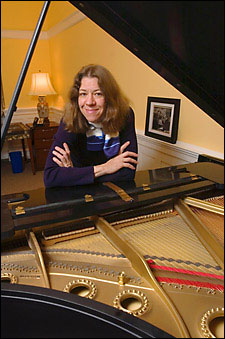Music is a life science
Opera aficionado Carolyn Abbate chose music over biology

History is repeating itself for Carolyn Abbate. Some three decades ago, as a Yale University sophomore and an accomplished young pianist, she told her parents she intended to turn her back on molecular biology to pursue a career in music.
“To them this plan sounded demented,” recalls Abbate, the Fanny Peabody Professor of Music at Harvard, Radcliffe Alumnae Professor at the Radcliffe Institute for Advanced Study, and one of the world’s foremost authorities on opera. “Now that I’m 50, they’re finally breathing a sigh of relief – it seems to have worked out, in their opinion.”
Growing up in and around New York City, Abbate first took up the piano at the tender age of 4. When she was 15, her parents moved to bucolic Amherst, N.H., a small village little changed since the 18th century. The move, while drastic, was “very good” for her, Abbate says, noting that in New Hampshire, “the people who wanted to do chamber music were few and far between.” During her two years there, she continued to perform, and represented the Granite State in a nationwide piano competition sponsored by the Music Teachers National Association.
Even as her musical prowess grew, “I was supposed to be a scientist,” Abbate says. She took advanced placement courses and exams, and attended the famous Advanced Studies summer program at St. Paul’s School in Concord, N.H., with a concentration in biology. Her steady diet of chemistry, biology, and mathematics courses continued at Yale.
But Abbate also found herself mesmerized by the music-making at Yale, particularly in her residential college, Jonathan Edwards, which was then famous for its focus on music. There, she heard private performances for Jonathan Edwards students by artists such as the renowned Guarneri String Quartet, tenor Peter Pears, and pianist Peter Serkin – artists normally found in the world’s most prestigious concert halls, not in neo-Gothic dining halls playing for the lucky few.
It was at Yale, as well, that Abbate first worked on opera productions and was drawn to the history of opera, inspired like many others by musicologist Robert Bailey, a Wagner scholar famous for his lectures on 19th century culture. Captivated by the productions mounted on campus, Abbate also found herself intrigued by the visceral appeal of opera experienced live and on the stage, especially at the Metropolitan Opera in New York.
“I’d heard operatic recordings, but recordings have never done much for me,” she says. “These performances had such tremendous power; the voices were used to such spectacular effect.”
“That was that,” Abbate says of her decision to ditch science for music. “When something hits you that strongly, it’s what you’re meant to do.”
After graduating from Yale in 1977, Abbate attended the Ludwig-Maximilians-Universität Munich in 1979 and 1980. Fluent in French (she is a skilled translator of French scholarly works, most recently rendering Vladimir Jankélévitch’s 1960 “La Musique et L’Ineffable”), she also became adept in German, eventually becoming a visiting professor at the Freie Universität in Berlin and a fellow at the Wissenschaftskolleg (Institute for Advanced Study) in the same city. She was living there when the Berlin Wall fell and the country was reunited, a heady moment in German history.
Abbate’s recent scholarly writings have argued that abstract analysis of musical works, common in traditional scholarship, bypasses music’s ephemeral, phenomenal form. She is writing a book with the working title “Overlooking the Ephemeral,” which examines why humanists shy away from these transient aspects of performance, and whether it is even possible to speak about such fleeting experiences.
“There’s a historical component as well, though,” Abbate says of the book. “For instance, I am working on a theory that, in German expressionist silents, music played for actors while they were doing their scenes affected and controlled their pacing and gesture, and that this carried over into musical performance scenes in talkies. Another part of the project has to do with sound recording technology, and the ways in which classical opera recordings were constructed in the heyday of LP recording – the 1950s and ’60s – and the degree to which peculiarities in singers’ voices were favored over more neutral sounds.”
Abbate’s interest in performance as physical presence reflects her enduring connection to the practical side of music and theater. She continues to accompany singers in Lieder and voice recitals, which remain her favorite genre as a pianist, since “they put the spotlight on the singer, not on me.” She wears a completely different, essentially nonmusical hat when working now with opera production – for instance, serving last year as dramaturge for a new production of “Don Giovanni” at the Met. One thing has led to another, and she now finds herself called upon for dramaturgical assistance with some regularity.
Abbate is also known to countless listeners as a fixture on the Met’s “Live From the Met” radio broadcasts. She offers commentary and mini-lectures during intermissions of performances broadcast on this program, as well as taking part in live “stump the experts” panels.
“They always do stump us, and we’re always terribly embarrassed,” she concedes.




